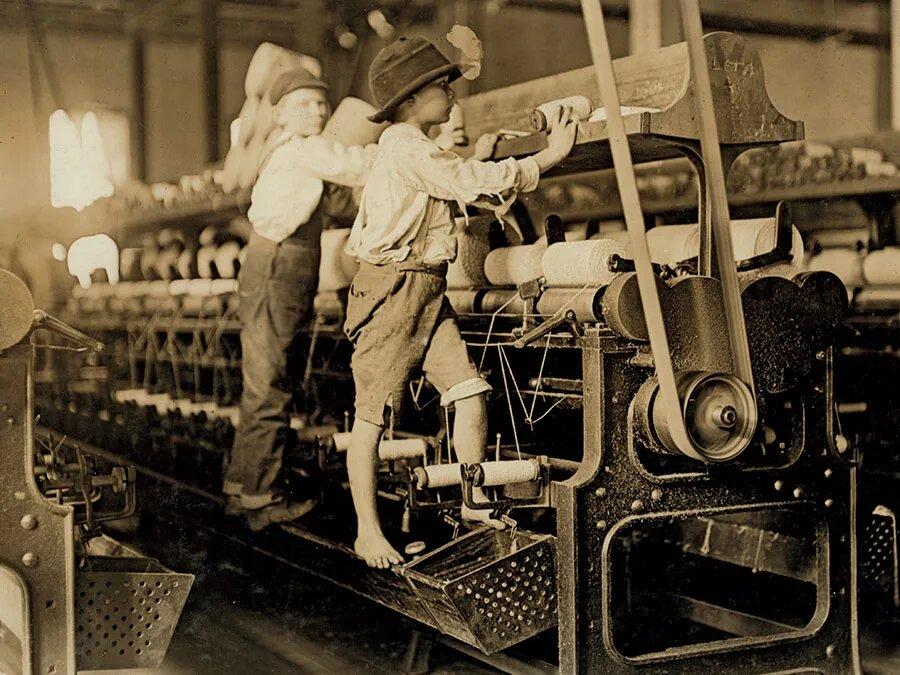Created by Colin Schroyer on Mon, 03/18/2024 - 21:58
Description:
The Industrial Revolution brought about wild changes to the economical and social infrastructure of the United States. With a sprouting of factories and industrial plants across the country, those regions of high work activity became the new hubs for living, such as in Pittsburgh, Pennsylvania. John P. Rafferty, for Encyclopedia Britannica, wrote,"[The] economic transformation changed not only how work was done and goods were produced, but it also altered how people related both to one another and to the planet at large. This wholesale change in societal organization continues today, and it has produced several effects that have rippled throughout Earth's political, ecological, and cultural spheres" (Rafferty). While progressing the development of cities and increasing the number of jobs, the Industrial Revolution brought with it a smattering of its own issues.
One such issue was the increase in child labor. A photograph taken by Lewis Wickes Hines shows two small boys climbing on heavy machinery just to be able to operate it. While the development of these new machines were impressive and effective, the business practices employed to operature such machines were not. Furthermore, the employment of children merely exacerbated the already dire issue of unsafe and unclean working conditions, which one man had set out to expose.
Upton Sinclair's 1909 novel The Jungle tells the story of Jurgis Rudkis and his family, who had moved to Chicago from Lithuania to escape financial hardship and find success through the American Dream; Jurgis takes a job at a local meatpacking plant and begins to see the glorious American image begin to shatter when confronted with unsafe, unclean, and uncaring working conditions. Sinclair, while capturing just how far this revolution had progressed, also exposed its greasy underbelly. One passage presents the philosophy of many employers, viewing their workers in the same way the workers viewed the meat the operated with. To quote from The Jungle, "What the hog thought of it, and what he suffered, were not considered; and no more was it with labor, and no more with the purchaser of meat. That was true everywhere in the world, but it was especially true in Packingtown; there seemed to be something about the work of slaughtering that tended to ruthlessness and ferocity—it was literally the fact that in the methods of the packers a hundred human lives did not balance a penny of profit" (Sinclair). In this passage, Sinclair details the abusive, neglectful view of workers, prioritizing financial gain above all else. In other sections of the novel, Sinclair focuses on the direct working conditions, rather than general immoral employment practices. However, The Jungle was written to be an exposé on the foul conditions of United States meatworking factories in order to incite change; and it worked! The Jungle's exposal of factory and food conditions directy resulted in new legislature. Scholar Michael Moghtader writes, "the novel is recognized as a classic example of muckraking fiction whose description of Chicago's meatpacking industry influenced the United States Government to change the food spoilage laws in the early part of the twetieth century" (Moghtader 13).
The Industrial Revolution brought with it some exciting developments in the progression of United States labor and work, but so too it brought dangerous steps backwards. Fortunately, the work of authors like Upton Sinclair helped to bring such issues to light and led to legislature for the betterment of the workforce and for children.
Works Cited:
Hines, Lewis Wickes. "488 Macon, Ga. Lewis W. Hine 1-19-1909. Bibb Mill No. 1 Many youngsters here. Some boys were so small they had to climb up on the spinning frame to mend the broken threads and put back the empty bobbins. Location: Macon, Georgia." Library of Congress, 19 January 1909, https://www.loc.gov/resource/nclc.01581/. Accessed 5 May 2024.
Moghtader, Michael. “Discursive Determinism in Upton Sinclair’s ‘The Jungle.’” CEA Critic, vol. 69, no. 3, 2007, pp. 13–27. JSTOR, http://www.jstor.org/stable/44377657. Accessed 5 May 2024.
Rafferty, John P.. "The Rise of the Machines: Pros and Cons of the Industrial Revolution". Encyclopedia Britannica, 30 Sep. 2017, https://www.britannica.com/story/the-rise-of-the-machines-pros-and-cons-.... Accessed 5 May 2024.
Sinclair, Upton. The Jungle. Doubleday, Page & Co., 26 February 1909, https://d1lexza0zk46za.cloudfront.net/history/american-documents/documen.... Accessed 5 May 2024.
Copyright:
Associated Place(s)
Part of Group:
Featured in Exhibit:
Artist:
- Lewis Wickes Hines


